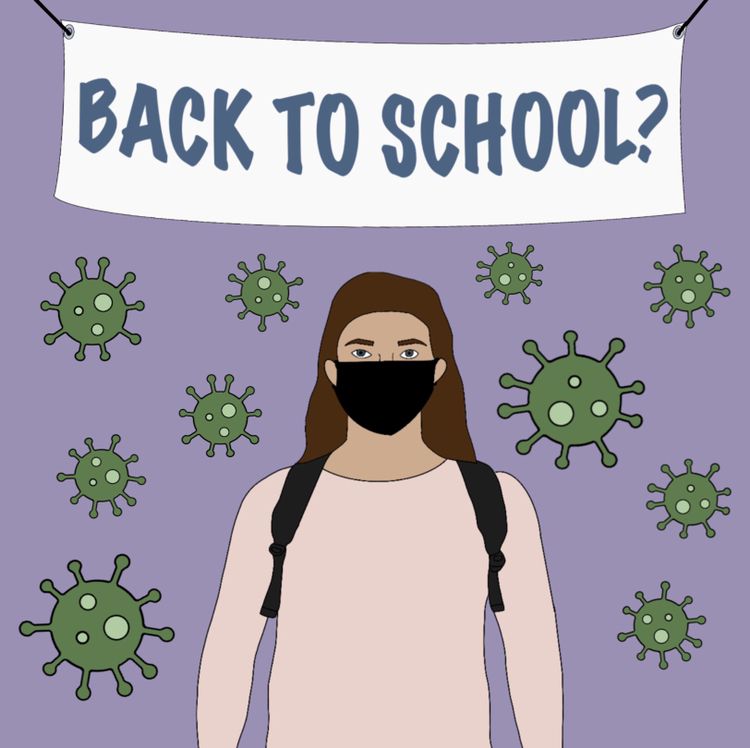The return of school with autoimmune diseases
Students with autoimmune diseases are faced with many obstacles, especially those related to the COVID-19 crisis, due to their compromised immune systems.
November 8, 2020
Transitioning from online to in-person school calls for many changes in students’ routines and comfort. Students with autoimmune diseases are more susceptible to contracting Covid-19 and have incorporated the obstacle of being at a higher risk in their choice to return or not.
Senior Daniel Goldman, a student who suffers from Crohn’s disease, said he has grown accustomed to doing school from his home. Crohn’s disease is a form of inflammatory bowel disease that can cause abdominal pain, fatigue, diarrhea and weight loss. In the past, Goldman struggled to keep up in school because of his disease.
“Last year, I missed a good majority of the year,” Goldman said. “My homebound teacher would get all my work and bring it to my house. Now, it’s a lot easier to stay on top of assignments because everything is online and on Google Classroom.”
Stress can worsen the symptoms of an autoimmune disease such as Crohn’s disease.
Senior Lucia Fernandez, who also has Crohn’s disease, believes her stress about being exposed to Covid-19 will amplify the effects of her disease.
“I’m already facing things that are incredibly stressful right now like the pandemic and the election, so I definitely have had a lot of flare-ups that are stress-related recently,” Fernandez said. “If I’m at school, that’s just more stressful because it will be a system a lot of people aren’t in favor of and, also, because I will have to be incredibly careful.”
Fernandez is unsure whether Grady will be able to maintain a mask mandate and promote other safety precautions once in-person learning starts, possibly as early as January. Since Fernandez is more at risk, these health protocols were the main factors in her decision not to return to face-to-face learning.
“I think it is a matter of figuring out what to do during lunchtime, how to deal with transitions, and also ensuring that all students are wearing masks at all times,” Fernandez said. “If people are actually wearing masks and there are safety precautions happening, I will go back. I just don’t know if that is going to happen, and also I feel like going throughout the hallways and lunch are two really big ways of students crowding.”
Sophomore Nikolas Bruckman, who suffers from an immune disorder due to an id reaction, or an inflammatory skin lesion causing immune system issues, says the number of people in the hallways was a crucial factor in his decision not to go back to school. Bruckman believes the hallways need to be less crowded to keep the spread of Covid-19 minimal.
“My main worry is definitely the hallways because Grady’s hallways are infamous for being packed,” Bruckman said. “If that is still the case, I will definitely not be going back because if I’m in them between classes, I can’t make space for myself. If I’m in the classroom, I can sit in the corner, but if I’m transitioning in the hallways, I can’t.”
Despite Bruckman’s unease about the safety precautions, he still wishes to return to school face to face when he believes conditions are safe. Because of outside distractions, Bruckman believes online school isn’t the best environment for him.
“I enjoy in-person school way more because I struggle to focus in online school,” Bruckman said. “When it comes to learning, and overall, school in general, I definitely prefer in-person. However, while it may be hard to focus at home, I also feel like it would be hard for me to focus at school because I would be really paranoid about getting sick.”
Goldman also hopes to return to school since it’s his last year at Grady.
“It’s my senior year, so I really want to go back,” Goldman said. “I’d say my motivation to go back to school is to see my friends and some teachers, but if in-person school is going to be the same as online school with just sitting in a classroom on the computer, I will wait until it is safe.”









